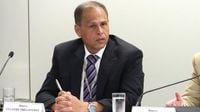Eduardo Tagliaferro, the former advisor to Minister Alexandre de Moraes at Brazil's Superior Electoral Court (TSE), did not attend a public hearing at the Senate's Public Security Commission on April 30, 2025, citing "personal matters" and concerns for his family's safety. His absence has drawn significant attention, particularly as it relates to ongoing investigations into alleged misconduct surrounding the so-called Vaza Toga scandal.
During the session, Senator Flávio Bolsonaro (PL) shared an audio message from Tagliaferro, in which he expressed gratitude for the invitation but reiterated his inability to attend due to personal issues and the need to protect his family's safety. "Good afternoon, this is Eduardo Tagliaferro speaking. I wanted to thank you for the invitation received through my lawyer. Unfortunately, I could not attend due to personal matters and also for the preservation of my safety and that of my family. However, at an opportune moment, I will be available to answer any questions you may have. Have a great afternoon, and God bless you all," Tagliaferro stated in the audio.
The hearing was requested by Senator Eduardo Girão (Novo-CE), who has accused Moraes' office of ordering the creation of reports at the TSE to facilitate actions against supporters of former President Jair Bolsonaro. Girão's request highlights ongoing tensions and allegations of political manipulation within Brazil's electoral processes.
Tagliaferro was indicted earlier in April 2025 for allegedly leaking confidential information while serving as the head of the Special Advisory for Combating Disinformation at the TSE. The Federal Police (PF) claims that he leaked sensitive information to the press, which was intended to undermine the reputation of the Supreme Court minister and discredit the impartiality of the court's members. The leaked messages, obtained after authorities seized Tagliaferro's cell phone in 2023 during an investigation into domestic violence, allegedly contained discussions about the internal workings of the TSE's advisory.
In a related development, journalist Sérgio Tavares testified at the Senate hearing, claiming that Tagliaferro feared for his life due to threats from the Primeiro Comando da Capital (PCC), a notorious criminal faction. Tavares revealed a conversation between Tagliaferro and journalist Oswaldo Eustáquio, which he stated occurred approximately eight months ago. "If these statements had been made recently, I could not disclose an audio and jeopardize a man's escape plan who said that the PCC was sent to kill him on orders from Alexandre de Moraes," Tavares explained.
Despite the serious allegations, Minister Moraes did not attend the hearing, which has drawn criticism from opposition lawmakers. They argue that his absence reflects a lack of accountability regarding the alleged misuse of TSE resources to target political opponents. Senator Magno Malta (PL-ES) described Moraes as "an impoluta and disgusting figure that affronts this country," while Girão emphasized the need for transparency regarding the "secrecy in higher courts in Brazil."
As the hearing unfolded, it became apparent that the absence of Moraes and other key figures, including auxiliary judges Marco Antônio Martins Vargas and Airton Vieira, further fueled the discontent among opposition senators. Their absence was particularly notable given the gravity of the allegations surrounding the Vaza Toga scandal, which has captured national attention.
In 2024, Folha de S.Paulo published a series of reports detailing leaked messages between Moraes' office and TSE advisors, indicating that the minister had orchestrated clandestine operations to support investigations against activists and media aligned with Bolsonaro. These revelations have raised questions about the integrity of the judicial processes in Brazil, particularly concerning the handling of disinformation during elections.
Senator Flávio Bolsonaro, who presided over the hearing, noted the significance of the testimonies presented but expressed frustration at the absence of key figures. "I do not see his presence here," he remarked while highlighting Moraes' lack of engagement with the Senate's inquiries.
In light of these developments, Tagliaferro's lawyer, Eduardo Kuntz, has requested that the Senate reschedule the hearing, allowing for Tagliaferro to participate remotely. This request underscores the ongoing complexities and sensitivities surrounding the investigation into the Vaza Toga scandal, as well as the broader implications for Brazil's political landscape.
The Vaza Toga case continues to evolve, with significant ramifications for both the judiciary and the political arena in Brazil. As the Senate's Public Security Commission seeks to uncover the truth behind the allegations, the absence of key players like Moraes raises questions about accountability and transparency within the government.
As the situation develops, the public and political observers alike will be watching closely to see how these investigations unfold and what impact they will have on Brazil's democracy and electoral integrity.






